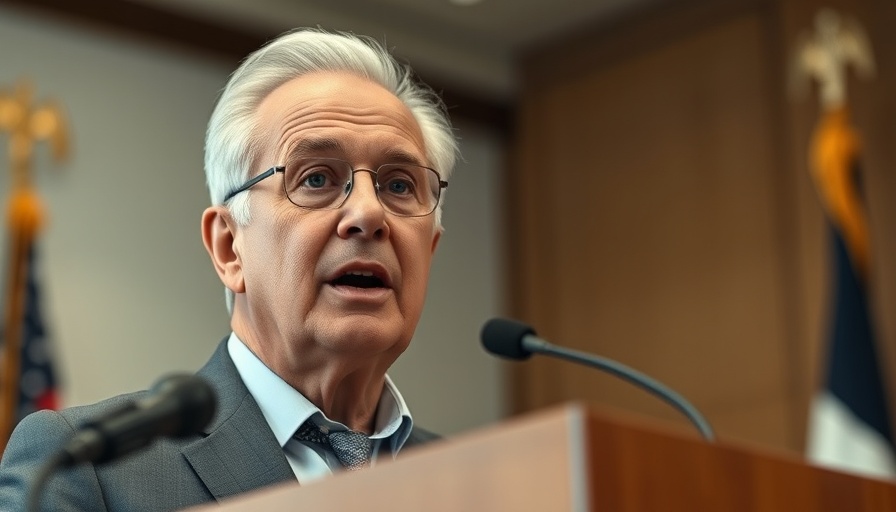
Trump's Bold Move: Seeking Diplomacy with Iran on Nuclear Weapons
In a surprising turn of events, former President Donald Trump announced he has sent a letter to Iran's Supreme Leader Ayatollah Ali Khamenei, pressing for negotiations regarding Iran's contentious nuclear program. His comments came during a recent interview with Fox Business News, emphasizing the urgency of reaching an agreement to prevent further escalation of tensions.
Trump’s assertion reveals his desire to shift the narrative from military intervention—an option he warned could lead to dire consequences—for a diplomatic resolution. He stated, "I would rather negotiate a deal... I'm not sure that everybody agrees with me, but we can make a deal that would be just as good as if you won militarily." Trump indicated that the time for negotiations is pressing, expressing hope that Iran would respond positively to his letter.
Iran's Defiant Stance Amid Ongoing Tensions
Despite Trump's outreach, Iran has remained firm in its stance against any negotiations while U.S. sanctions are still in place. Iranian officials, including Foreign Minister Abbas Araghchi, have firmly stated that there can be no dialogue under current sanctions imposed by the U.S. This defiance is further compounded by increasing production of uranium enriched to near weapons-grade levels, raising concerns over the potential for military confrontation.
The most recent reports by the International Atomic Energy Agency (IAEA) reveal that Iran has significantly ramped up its uranium enrichment efforts, reaching levels that could expedite its capacity to develop nuclear weapons. This development contradicts previous agreements under the 2015 nuclear deal, a framework Trump abandoned during his first term.
The Stakes: What’s At Risk for Both Nations?
The stakes could not be higher as both the U.S. and Israel remain committed to preventing Iran from acquiring nuclear weapons. Trump's position reiterates the long-held U.S. policy of 'maximum pressure,' which has led to devastating economic consequences for Iran but has not led to successful negotiations. Should talks fail, the looming threat of military action remains, a sentiment reiterated by Trump during the interview where he said, "if we have to go in militarily, it’s going to be a terrible thing—for them."
≤h2>Historical Context and Its Relevance TodayThe backdrop of this letter-writing endeavor recalls a similar strategy Trump employed with North Korean leader Kim Jong Un in his first term, which, although controversial, led to unprecedented face-to-face meetings. However, those interactions ultimately produced no lasting agreements. Trump's historical approach raises questions about whether the same tactics can be leveraged to instigate meaningful dialogue with Iran or whether it will mirror past failures.
Seeking Peace: The Path Forward
As strategies unfold, both nations must navigate the complex web of regional politics, economic pressures, and public sentiment. Trump's intentions, while perceived by some as bravado, reflect a broader strategy to pivot from aggression to diplomacy—a necessary shift if both parties are to avoid catastrophic military conflict.
The international community watches closely, aware that renewed hostilities could destabilize not just the region but spark a global crisis. Iran’s Supreme Leader Khamenei has hinted at a potential willingness to engage, stating that there is "no harm" in dialogue with the U.S. However, the road to deliberation remains fraught with hurdles, including domestic politics and historical grievances.
Why This Matters: The Perspective of Average Citizens
For civilians both in Iran and the U.S., the potential for conflict or resolution carries profound implications. Families on both sides live under the specters of war and economic instability. Understanding how geopolitical strategy impacts everyday lives highlights the urgency of diplomatic engagement.
Final Thoughts: What Lies Ahead for U.S.-Iran Relations
The coming days may dictate the trajectory of U.S.-Iran relations and the possibility of averting a military confrontation. Trump’s letter may yet prove to be a turning point—should it catalyze dialogue, or will it simply deepen distrust? As the situation unfolds, one thing remains clear: sustained attention will be essential in pursuing a stable future for both nations.
In light of these developments, consider engaging with the news surrounding U.S.-Iran relations for a deeper understanding of the ongoing geopolitical landscape and implications for global peace. The future may still hold possibilities for resolution amidst the tensions.
 Add Element
Add Element  Add Row
Add Row 



Write A Comment